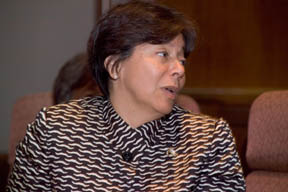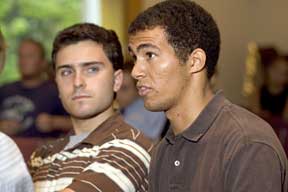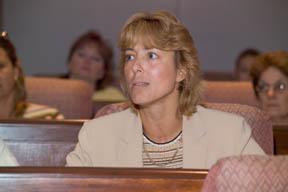Faculty wins demands for greater voice in choice of next president
Two additional members of the Cornell University faculty will be added as full members to the Presidential Search Committee, Charles Walcott, dean of the faculty, has announced. The new members will be chosen from a list of four or five candidates suggested by the university's nine-member Nominations and Elections Committee.

Walcott also announced that as the search for Cornell's next president nears its end, a small group of faculty will be invited to meet with the final candidates and to share their opinions of the candidates with the full search committee.
Walcott said the additional faculty involvement in the search process was a direct result of a meeting of the faculty with members of the search committee Tuesday, Aug. 30. He said that Peter Meinig, chair of the Cornell Board of Trustees, and Diana Daniels, chair of the search committee and vice chair of the board, agreed to the increased faculty involvement.
The more than 200 faculty members attending Tuesday's open meeting with the search committee agreed by an overwhelming show of hands to recommend increased faculty participation in the search for a successor to former president Jeffrey S. Lehman.
The vote followed a 90-minute meeting in a packed Hollis E. Cornell Auditorium in Goldwin Smith Hall, during which the faculty members expressed, with some passion, their view that a compact between the faculty and the board had been breached. They argued that greater faculty involvement in the presidential search would be a first step toward recovering trust.
The faculty discontent was aired to seven search committee members, including Meinig and Daniels. Other members of the search committee at the meeting were Susan H. Murphy, vice president for student and academic services; Laura S. Brown, the J.W. Anderson Professor of English; Elizabeth D. Earle, professor of plant breeding and genetics; trustee Edwin H. Morgens; and Juris Hartmanis, the W.R. Read Professor Emeritus in Engineering and Computer Science.
Also on Tuesday, members of the search committee held separate open meetings with Cornell students and staff.
At the faculty meeting, many professors expressed their concern about the secrecy -- imposed by legal agreements -- surrounding the June resignation of Lehman. Others voiced their continued discomfort over the Cornell administration's decision to turn Redbud Woods on West Campus into a parking lot despite protests from faculty and students.

The nature of the Lehman resignation "violated the social contract in this micro-community," said Roald Hoffmann, the Frank H.T. Rhodes Professor of Humane Letters in Chemistry. Hoffmann pointed out the search for a new president could be long indeed if candidates share similar sentiments about the secrecy surrounding the Lehman resignation. Steve Kaplan, Goldwin Smith Professor of History, made a similar point: "How do you speak to people about the future if you don't talk about the past?"
In response, Meinig told the faculty that all personnel matters adhere to legal agreements and that the board of trustees acted in the interests of Cornell. "Every member has only one goal: to do the best for Cornell," said Meinig, maintaining that the board is drawn from a diverse and loyal group.
Daniels assured the audience of academics that full disclosure will be made to the final two candidates in the search, "but not beyond that." And, appealing for faculty advice on the search process she said, "It is easier to react to a suggestion than to a position."
Abby Cohn, professor of linguistics, gave five suggestions, including adding more faculty representatives to the search committee and opening the final interviews to the campus community. "We need a tangible sign that this is not business as usual," said Cohn, who said she wanted more participation by the faculty. Others concurred on the need for a transparent and inclusive selection process.
Daniels replied that "we will take your suggestions seriously -- I hope we can do something to let you know you have been heard." Previously Daniels had told the clearly unhappy audience, "I feel we are stuck in a rut and that we need to find a way to get beyond that."
The academics also raised concerns about a lack of communication between the Cornell administration and the faculty, particularly regarding the response to a letter to the administration opposing the building of the Redbud Woods parking lot that was signed by more than 400 faculty members.

Meinig agreed: "It is important to have an interchange of dialogues."
The session began with introductions by Interim President Hunter R. Rawlings, who spoke on the duties of a Cornell president, and by Daniels, on the selection process itself. "The search committee is large because it involves all constituencies: staffs, faculties, students and alumni," said Daniels. "The search will take as long as it takes. We'll be deliberate, but we're also moving full speed ahead."
During the meeting held for students in the Biotechnology Building, topics ranging from the $200 million West Campus Residential Initiative to the ideological diversity of the faculty were discussed. Alumni-elected trustee Bob Harrison '76 headed the search panel. About 30 students attended, but nearly all spoke more than once and offered opinions on what qualities Cornell's next president should have and what challenges Cornell will face in the next five years.
A few students lamented the low turnout for their own meeting and said they believe many of their classmates have "come to expect not to be listened to." But the students who did attend had much to suggest to the committee, whose members present included student-elected trustees Josh Katcher and Doug Mitarotonda. Several students stressed that they would like to see the campus reunited on all levels -- between students, faculty, staff and the board of trustees -- and for the university, and Cornell's next president, to continue to work on sustainability, diversity and making a Cornell degree more affordable to all.
In the meeting for staff, which was held earlier that day in the Statler Hotel, about 50 people spoke about the ability of the Employee Assembly to communicate effectively with the administration, employee morale, the move of some Cornell offices to downtown Ithaca and the West Campus Residential Initiative. The committee that listened to staff was led by staff-elected trustee Michael Esposito '03. Many staff members said they would like to make sure a new Cornell president recognizes that the staff is an important stakeholder group.
Media Contact
Get Cornell news delivered right to your inbox.
Subscribe